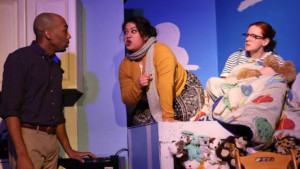Birth and Death with Comic Brio: AND BABY MAKES SEVEN at The Strand Theater Company

Paula Vogel has been at the top of the heap of contemporary playwrights for some time, winning more awards than a critic can count, and getting produced everywhere. Personally, however, I've come late to the Paula Vogel conversation, as my first exposure to her work was last month's Center Stage revival of her comparatively recent play, Indecent, which played on Broadway in 2017. This revival made me want to see everything else of Vogel's - and I'm sure there are a lot of Baltimore theatergoers who are similarly inclined. What luck, then, that another opportunity has presented itself right away, in the form of a revival of a much earlier work, And Baby Makes Seven (1984), at The Strand Theater. (The Strand describes itself as "the only brick-and-mortar theater in Baltimore to present outstanding works written ONLY by women artists.") Given that Indecent was rather a serious play, I was not expecting Baby to be, as I found it, flat-out hilarious; in fact I haven't laughed so hard in any theater since The Play That Goes Wrong.
The first part of the premise borders on a commonplace these days, though it was more unconventional in 1984: a female couple, Ruth (Jess Rivera) and Anna (Katharine Vary), borrowing Peter, a gay male friend (Grant Emerson Harvey), to conceive a baby which Anna is carrying. The second part is a bit more unusual: Ruth and Anna inviting Peter to live with them and raise the expected baby jointly. The third part is whimsical: the complication that Ruth and Anna have previously populated the house with three imaginary children already, whom they impersonate off and on unpredictably, which bothers Peter enough so that they all reach consensus on the fourth part. And the fourth part, the consensus, is positively Virginia Woolf-esque: a determination to kill off each of the nonexistent children - or at least so it appears. (There is a twist at the end I shall not discuss.) The number of protracted death scenes this decision precipitates threatens to rival what one might see in a Jacobean tragedy, though the killings are all done with the comic brio of the mayhem in A Gentleman's Guide to Love and Murder (be on the lookout for the appearance of the spray can of whipped cream).
Adding to the general hilarity are the eruptions of the childish personalities Ruth and Anna harbor within their adult selves. Ruth is host to the personalities of Orphan, a feral child, and Henri, a reincarnation of the young hero of The Red Balloon. And Anna's "multiple personality" is Cecil, a nerd-brain nine-year-old. When this play returned to Off-Broadway in 1993, the New York Times' killjoy critic professed to be bored by adults playing with childish voices and manners. All I can say is, the man must tire easily; as for me, I just kept on laughing, especially at the death scenes with undertones of, respectively, horror-movie guignol, French cinematic sentimentality, and Julius Caesar. And another moment to wait for is the epic duel over a peanut-butter-and-jelly sandwich between Henri and Orphan. It is the childishness of the adults impersonating the two of them that render this moment a small classic.
The three performers all rise to the very complicated occasion. Grant Emerson Harvey may have been given a little less to do - fundamentally, at least through most of the show, he's called upon to be consistently disapproving or non-plussed, but he carries out that assignment unexceptionably. The two female performers, Katharine Vary and Jess Rivera, slay. I loved the ways they kept shifting among their multiple personalities. And Rivera is a natural physical comedian. Her mugging alone is worth the price of admission. Emily Hall's direction, I'm sure, had much to do with pushing these over-the-top performances, uh, over the top.
Tips of the hat as well, to Kate Smith-Morse for the playhouse-colored set, and Lana Riggins, who in the program may disparage her role as lighting designer as "turning lights off and on," but whose very frequent cues were awfully useful in keeping us theater-goers apprised of exactly where on the continuum of reality and unreality we were at any given moment.
Is this an important play, like Indecent? No. The only thematic message, apart from the goes-without-saying affirmation of LGBTQ life choices, is that we should not "be afraid to play," which is about as anodyne as they come. But since when need hilarity justify itself with a message?
And Baby Makes Seven, by Paula Vogel, directed by Emily Hall, through April 21, at The Strand Theater, 5426 Harford Rd, Baltimore, MD 21214. Tickets $10-$20 at https://app.arts-people.com/index.php?ticketing=stran . Sex graphically described, sexual situations, comical death scenes, alcohol consumption.
Photo Credit: Shaelyn Jae.
Comments

Videos

